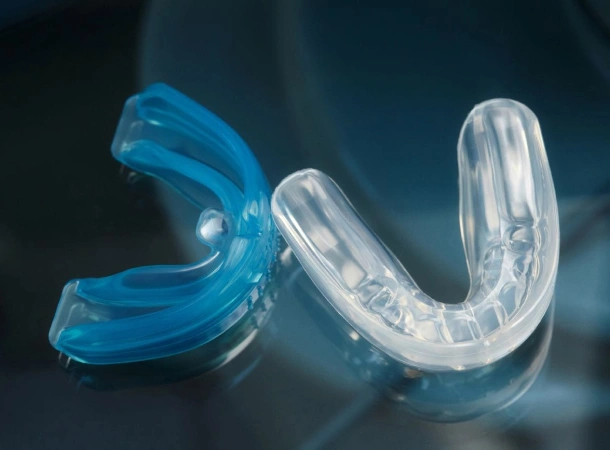Emergency & New Patients Welcome!

The Consequences of Teeth Grinding
Stress, anxiety, malocclusion, jaw disorders, airway issues or sleep disorders cause many people grind or clench their teeth at night.
That is called bruxism. Grinding your teeth can cause damage to your teeth and restorations, jaw pain, headaches and other dental problems. A night guard is recommended to protect the teeth and muscles while you are sleeping. There are many nightguards out there but the custom made night guard made in a dental lab can avoid many unwanted problems like TMJ issues and an altered bite which are common with commercial night guards.
Benefits of Using Night Guards for Bruxism
Bruxism, the habit of grinding your teeth, can occur during the day or while you sleep. This condition is often triggered by feelings of anger, stress, or anxiety and typically happens unconsciously. Unfortunately, bruxism can significantly impact your oral health, leading dentists to recommend the use of a night guard. In conjunction with anxiety treatments, such as therapy or medication, a night guard can help protect your teeth.
While night guards won't entirely eliminate teeth grinding, they are effective in preventing damage to fillings, minimizing tooth chipping or loosening, and reducing excessive wear on tooth enamel. Additionally, wearing a night guard may improve your sleep quality and alleviate symptoms associated with bruxism.
Signs You May Need a Night Guard:
Increased tooth sensitivity or discomfort
Biting of the cheeks
Receding gums
Persistent tiredness due to disrupted sleep
Facial discomfort from tight or sore jaw muscles
Headaches, particularly in the temples
Using nightguards for TMJ offers several benefits.
The temporomandibular joints (TMJ) are essential for the movement of your mouth. However, grinding your teeth can lead to issues with these joints, resulting in TMJ disorders and symptoms such as jaw pain, clicking or popping sounds, and a locked jaw. TMJ disorders can also arise from inflammation or jaw injuries. Thankfully, using night guards can help align your jaws properly while you sleep, reducing muscle tension and alleviating TMJ-related symptoms.
Common Symptoms of TMJ Disorders:
Facial pain or discomfort
Neck and shoulder pain
Intense discomfort resembling an earache
Ringing or buzzing sounds in the ear
Difficulties with chewing or speaking
Discomfort while eating or talking